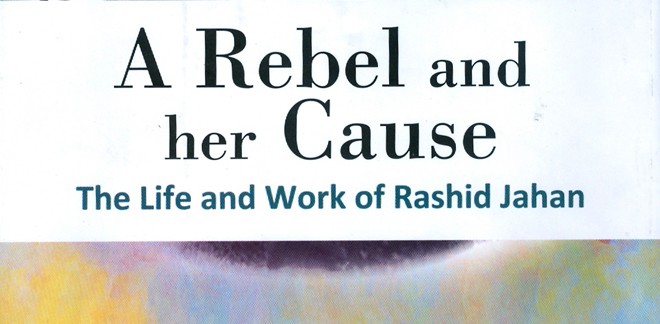
A useful book that brings into focus the literary worth of a pioneer writer and opens it to the non-Urdu reading world

Rashid Jahan was a woman far ahead of her times. And she had to be because the vision that she had of society and particularly women living in that society was a dream that was grounded in the reality of the times she lived in. The rest was all a projection of how an equitable society is supposed to be.
Like most literature produced under the influence of the Progressive Writers Association, hers too swings from the stark reality unleashing the conditions that existed and a utopian vision of the resolution of those contradictions and conflicts.
The condition of women particularly Muslim women in India was wrapped in layers of conservatism. There was great deal of discrimination and segregation that was justified in the name of religion and traditions. Education in the formal sense was also denied to them and when Rashid Jahan’s father Sheikh Abdullah set up a school at Aligarh for the education of women there was a huge blowback effect. He was attacked in every conceivable way but the school not only survived but became a college later integrated into the Aligarh University setup.
In retrospect, when women’s higher education is no longer an issue, let alone education, it was a much needed step in the right direction. Even Sir Syed Ahmed Khan about thirty years earlier had feared to take such a daunting initiative.
Rashid Jahan was the product of that family and that school and she took up higher education becoming a medical doctor -- both pioneering steps for Muslim women. She was also sucked into the ideological magnetic field of Marxism and in the process ended up being a writer as well.
The writings of these progressives were violently reacted to because of the stark realism they portrayed. It became doubly problematic when the author happened to be a woman. In a society where repression was glorified in the name of propriety, modesty and total subservience to men, individual voice of a woman was perceived as a signal of great threat.
And since Rashid Jahan’s name and works were also included in Angaray, the magazine that had created a furor in the 1930s, the magazine was banned, declared filthy and immoral, hurting the sentiments of the Muslim community. She too was branded more than others because she happened to be a woman.
The status of Rashid Jahan as a writer has been a topic that is debated heatedly. Did she have the ability to write well or was she just good enough to create a controversy? To her credit, the issues that were untouched by writers were taken up by her and in the process exposed her as a woman when prudence was the order of the day.
She in many ways was a pioneer. Her professional career as a medical doctor was also a groundbreaking effort as professional woman particularly in the medical fields were unimaginable. Then her role as an activist and as a writer not held back by the prevalent values of society was equally important.
No wonder she proved to be a beacon light for Muslim women and showed them the path which many traversed later like Ismet Chugtai, Attiya Hosain, Razia Sajjad Zaheer and Sadiqa Begum Soharvi. She showed that women could express themselves and it can be counted as literature and not merely bedtime stories for the young. She was a card carrying member of the Communist Party of India and also served on the editorial board of their magazine Chingari. She also edited the magazine when some of the editors were imprisoned or had to go underground due to repression and crackdown.
This book by Rakhshanda Jalil is useful because it brings into focus the writings of Rashid Jahan and opens the literary worth of the short stories that were published especially in Angaray. For years, the writings in Angaray were not available and it was only through secondary references that one read and heard of the controversy that was blown out of proportion. In retrospect, it appears to be so because what was considered taboo decades ago is an everyday read now. There has been tremendous openness about issues, topics and themes that are written about, now freely acted on stage and films. This could not have been imagined decades ago. Nothing it appeared is a no-go area as now, everything can be brought under the spotlight.
Translation is a difficult task and if it happens to be of poetry nearly verges on the impossible. Translating fiction is no less taxing so Rakhshanda Jalil has taken a huge leap in wanting to translate the stories and the plays of the pioneer writer in Urdu. It also opens thus a corpus of writings to the non Urdu speaking and reading world and puts the effort of early writers in perspective. This makes it easier for their real literary worth to be properly assessed.
The volume includes 63 pieces either short stories or plays or essay from four sources Aurat and Digar Afsane 1937, Shoal-e-Jawwala, Rashid Jahan ki Kahaniyaan and Nasr-e-Rashid Jahan.
Though much seems to be dated regarding the struggle of women and is considered fait accompli but in many parts of the country and sections of the population the same debate rages even now. Women’s education and the society which is segregated are still hotly contested for which men and woman can both be killed. So the life and works of Rashid Jahan are still very much relevant and have a ring of contemporaneity about them.